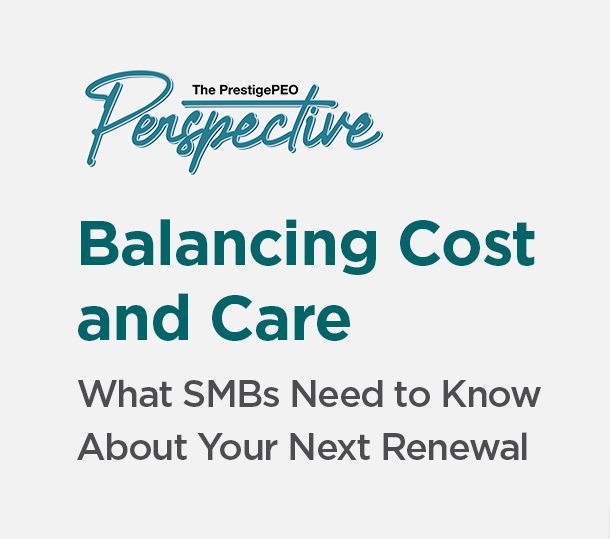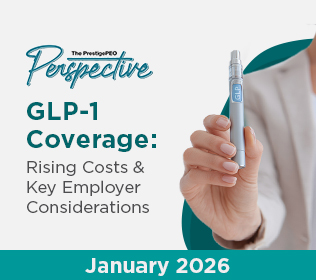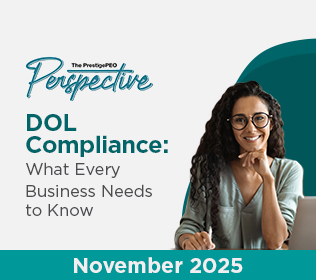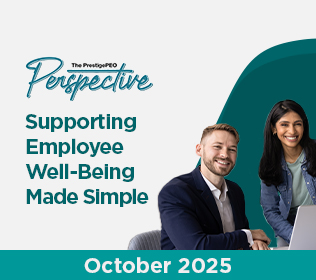

The Most Impactful Open Enrollment Trends Right Now
Open Enrollment is evolving. Are you keeping pace?
Our latest article explores the biggest trends shaping OE for SMBs in 2025. From shifts in employee expectations to tech-driven enrollment changes, these insights will help you make smarter decisions and stay ahead.

Your Step-by-Step Open Enrollment Guide
Essential Open Enrollment Checklist for Small and Mid-Sized Businesses
Our Open Enrollment checklist is designed to help businesses like yours prepare with confidence. From compliance updates to employee communication, it covers everything you need to know to make OE seamless.
This resource ensures you can focus less on logistics and more on supporting your people. Start planning today with PrestigePEO at your side.

Handling Difficult Employees with Confidence
Managing people can be rewarding but also challenging. In this on-demand webinar, PrestigePEO’s Executive HR leaders Elisabeth Shaw and Dee Hutcherson share practical strategies for addressing challenging behaviors, communicating confidently, and rebuilding stronger teams.
Watch the recording today and gain tools to lead with professionalism, empathy, and impact.

A Closer Look into the Big Beautiful Bill and No Tax on Tips
The “Big Beautiful Bill” was signed into law on July 4th by President Trump and notably included a provision to allow for certain workers to deduct significant portions of their tips and overtime income from federal taxes starting with the 2025 tax year. Upon its passage, the Big Beautiful Bill did not provide substantial guidance on what industries would be eligible for these deductions, but on September 1st a list was released by Axios from the Trump Administration that outlines the industries and occupations that would be eligible.
To summarize the language of the bill briefly, the “no tax on tips” provision includes that:
- Individuals must earn $150,000 or less in 2025 to be eligible; for couples, the combined income limit is $300,000 (this threshold will be adjusted for inflation in future years);
- Only cash tips (including those charged and those received under tip-sharing) and tips reported to employers for payroll tax purposes are eligible;
- The maximum deduction for tip income is $25,000 per year;
and
- Exemptions will only apply from TY2025 to TY2028 and will need to be extended by Congress to continue.
The list published by Axios comes from the Treasury Department that was ordered to publish a comprehensive list of the eligible occupations by October 2nd. From this list, there are 8 separate categories, and 68 job titles outlined. The full list has been provided below.
1. Beverage and Food Service
- Bartenders
- Wait Staff
- Food Servers (non-restaurant)
- Dining Room and Cafeteria Attendants and Bartender Helpers
- Chefs and Cooks
- Food Preparation Workers
- Fast Food and Counter Workers
- Dishwashers
- Host Staff, Restaurant, Lounge, and Coffee Shop
- Bakers
2. Entertainment and Events
- Gambling Dealers
- Gambling Change Persons and Booth Cashiers
- Gambling Cage Workers
- Gambling and Sports Book Writers and Runners
- Dancers
- Musicians and Singers
- Disc Jockeys (except radio)
- Entertainers and Performers
- Digital Content Creators
- Ushers, Lobby Attendants, and Ticket Takers
- Locker Room, Coatroom, and Dressing Room Attendants
3. Hospitality And Guest Services
- Baggage Porters and Bellhops
- Concierges
- Hotel, Motel, and Resort Desk Clerks
- Maids and Housekeeping Cleaners
4. Home Services
- Home Maintenance and Repair Workers
- Home Landscaping and Groundskeeping Workers
- Home Electricians
- Home Plumbers
- Home Heating/Air Conditioning Mechanics and Installers
- Home Appliance Installers and Repairers
- Home Cleaning Service Workers
- Locksmiths
- Roadside Assistance Workers
5. Personal Services
- Personal Care and Service Workers
- Private Event Planners
- Private Event and Portrait Photographers
- Private Event Videographers
- Event Officiants
- Pet Caretakers
- Tutors
- Nannies and Babysitters
6. Personal Appearance and Wellness
- Skincare Specialists
- Massage Therapists
- Barbers, Hairdressers, Hairstylists, and Cosmetologists
- Shampooers
- Manicurists and Pedicurists
- Eyebrow Threading and Waxing Technicians
- Makeup Artists
- Exercise Trainers and Group Fitness Instructors
- Tattoo Artists and Piercers
- Tailors
- Shoe and Leather Workers and Repairers
7. Recreation and Instruction
- Golf Caddies
- Self-Enrichment Teachers
- Recreational and Tour Pilots
- Tour Guides and Escorts
- Travel Guides
- Sports and Recreation Instructors
8. Transportation and Delivery
- Parking and Valet Attendants
- Taxi and Rideshare Drivers and Chauffeurs
- Shuttle Drivers
- Goods Delivery People
- Personal Vehicle and Equipment Cleaners
- Private and Charter Bus Drivers
- Water Taxi Operators and Charter Boat Workers
- Rickshaw, Pedicab, and Carriage Drivers
- Home Movers
What to expect next?
Employers and employees should be on the lookout for an official release of the list of occupations covered from the Treasury Department on October 2nd as there may be slight changes to the composition of the list and additional guidance will most likely be provided. Following the publication on October 2nd, the Treasury Department will publish the list and guidance to the Federal Registry before the 2025 tax filing deadline. Employers in these industries should prepare staff and management for these changes and should adjust payrolls to ensure accurate tracking and separate reporting of cash and shared tips on individual W-2s.
That’s where a partner like PrestigePEO makes a difference. We combine hands-on HR and compliance expertise with payroll precision and dedicated support to help you stay ahead of changing regulations. As policies evolve, we’ll ensure your business and employees remain protected, so you can focus on growth, not red tape. Contact us to learn how we can help!

Pay Transparency Laws Continue to Expand
Pay transparency remains a rapidly evolving compliance frontier for employers across the U.S. With new laws taking effect in several jurisdictions and enforcement activity increasing in others, now is the time for employers to evaluate their practices and prepare for what’s ahead. Below is a summary of key developments to help you stay informed and compliant.
What’s New and What’s Coming
- Vermont: As of July 1, 2025, employers with five or more employees and at least one employee working in Vermont must disclose compensation ranges in job advertisements, including remote roles performed predominantly in Vermont. Special rules apply to tipped and commission-based positions. Guidance published by the Vermont Attorney General can be found here.
- Cleveland, Ohio: Beginning October 27, 2025, employers with 15 or more employees in Cleveland must include salary ranges in job postings and are prohibited from asking applicants about their salary history. Employers will have 90 days to correct deficiencies before civil penalties are imposed.
- Massachusetts: Beginning October 29, 2025, employers with 25 or more employees in Massachusetts must include pay ranges in job postings and disclose this information to applicants and current employees upon request. Larger employers with 100 or more employees will also need to submit certain EEO Data Reports annually. A warning will be issued for the first offense, with escalating fines for subsequent violations. Employers will have two business days to correct defects until October 29, 2027. The Attorney General’s Office has published detailed guidance available here.
Enforcement Updates:
- Colorado: Enforcement is in full swing, leading to significant fines for employers in some cases. Common violations include omitting salary ranges, using vague or overly broad ranges, listing ranges below applicable minimum wage or salary thresholds, and failing to include a description of benefits or the required application deadline. “Technical issues” or inadvertent omissions are not accepted as defenses by the Colorado Division of Labor Standards and Statistics.
- New Jersey: The New Jersey Department of Labor and Workforce Development has clarified that the state’s pay transparency law applies if an employer meets the minimum employee threshold and either operates in New Jersey, employs individuals there, or accepts job applications from the state. This expansive interpretation has significant implications for multistate employers with any presence in New Jersey. Job postings for remote or out-of-state positions may still be subject to New Jersey’s requirements, including disclosure of salary ranges and restrictions on salary history inquiries.
- Illinois: Guidance from the state clarifies that the pay transparency law applies to remote positions if the employer has reason to know or could reasonably foresee that the work would be done, at least in part, in Illinois or would report to a supervisor, office, or worksite located in the state. This broad interpretation means that even roles posted as fully remote or based in other states may trigger compliance obligations.
Looking Ahead to 2026
Delaware is poised to join the pay transparency movement. House Bill 105, which is currently awaiting the governor’s signature, would require employers with 10 or more employees to include salary ranges and a summary of benefits in all job postings. This legislation would also introduce new recordkeeping requirements and impose penalties of up to $10,000 for repeat violations. If signed, the law would take effect one year after its enactment.
What Employers Should Do Now
- Audit job postings for compliance with current and upcoming laws and regulations.
- Train recruiting and HR teams on state-specific requirements.
- Establish internal protocols for documenting pay ranges and benefit descriptions.
- Monitor enforcement trends to avoid costly penalties and reputational risk.
Pay transparency is no longer optional; it’s becoming the standard for employers nationwide. Keeping up with shifting requirements across multiple states can be overwhelming and risky for growing businesses. That’s where PrestigePEO comes in.
We deliver expert HR and compliance support, backed by proactive guidance to help you protect your business and your people. With PrestigePEO as your partner, you’ll stay ahead of complex regulations while focusing on what matters most: running and growing your business.

ADA Accommodation Requests: Indefinite Leave and Remote Work
Employers are noticing increased requests for indefinite leave and full-time remote work under the ADA. Recent court rulings offer important insights into these matters. In Coffman v. Nexstar Media (4th Cir. July 2025), the court concluded that employers are not obligated to provide open-ended leave. If an employee is unable to provide a clearly defined return date, keeping the job open indefinitely does not meet the criteria for a reasonable accommodation. This ruling is applicable in Maryland, Virginia, West Virginia, North Carolina, and South Carolina, and may influence decisions in other regions as well.
Additionally, requests for remote work should be carefully evaluated. The Connecticut appellate court’s decision in Castelino v. Whitman, Breed, Abbott & Morgan, LLC (Conn. App. Ct. July 2025) established that employers are not required to allow full-time remote work if the job entails essential in-person tasks, such as managing physical documents or interacting directly with clients. This ruling is binding in Connecticut and could serve as a reference for other jurisdictions. Employers should evaluate each request individually, taking into account their operational requirements.
Employers operating in multiple states should recognize that some states, including California, New York, and New Jersey, have more favorable regulations for employees. Even if federal or specific state laws restrict indefinite leave or remote work options, local rules may require a more detailed review. A systematic and well-documented approach is essential for supporting employees, ensuring legal compliance, and maintaining efficient operations.
Employers must engage in the interactive process, which involves maintaining open lines of communication with employees, requesting updated medical documentation as needed, considering reasonable accommodations, and keeping detailed records. Remember, short-term disability benefits do not substitute for this process.
ADA accommodation requests are becoming more complex, with different rulings and obligations across states. For small and mid-sized businesses, staying compliant while maintaining productivity can feel overwhelming.
PrestigePEO gives you a dedicated HR partner and compliance expertise to help you evaluate requests, apply the law consistently, and protect your business. With us by your side, you’ll have the confidence to navigate ADA challenges while focusing on growth. Contact us to learn how!




